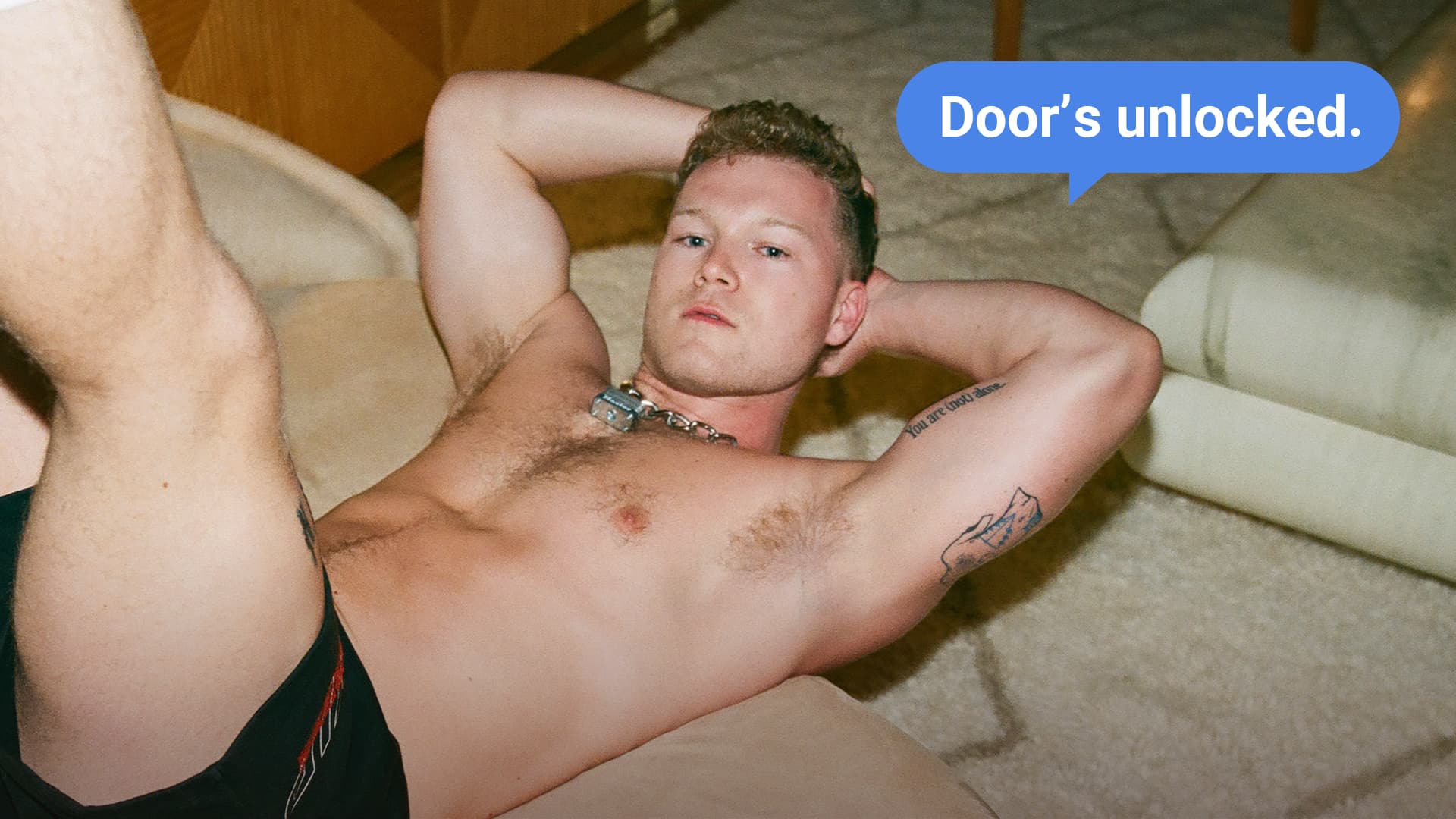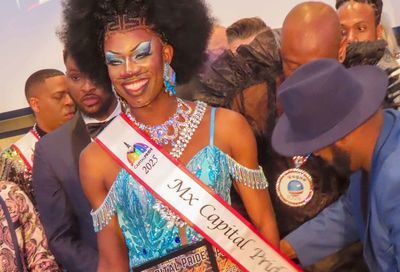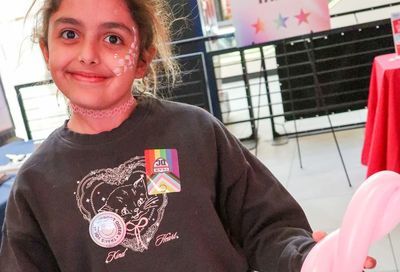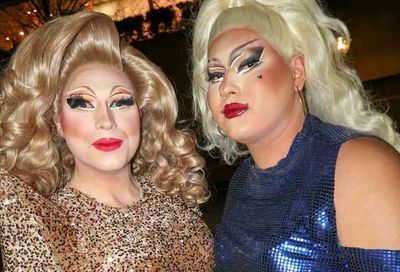
A few weeks ago, I was shooting a formal gay event. I approached a table of men and asked if they’d like to take a photograph. In exchange, the entire table of men starting coming on to me — asking me for my number, if I had a boyfriend, what I was doing there — all while simultaneously exchanging comments and yuk-yuks about me and my appearance. I made it clear that I wasn’t interested in engaging with them in that way, and took their photo. It was awkward. I was awkward. As I started to walk away, I heard several of them make further comments: “Well, he’s too skinny anyway.” “Those jeans are a bit tight, eh?” Laughter, etc.
This happens regularly when I shoot gay events. Once, after I asked for a photo, a man forcibly grabbed me and held me in a bear hug while he breathily whispered into my ear how attractive he thought I was. Once a guy kissed me. These men are all shapes, sizes and ages. I’m not flirting when this happens — not that flirting should give men an excuse to do this kind of stuff.
I’m a normal guy. So what is it that makes men feel entitled? Entitled to access someone else’s body?
As gay men we, it seems without thinking, will go at-bat for our female friends when it comes to body politics and their rights to live in the world as a human first, woman second. But why don’t we do this for one another? Why do we create or allow environments where we permit and perpetuate the reduction of one another as things to be had? Just because we lack the hetero gender inequality thing doesn’t mean it’s fun to feel like our primary worth in any given situation is our sexual availability, whatever sub-culture of the gay community we feel at home in. It might be a more level playing field between us guys, but that doesn’t mean we should do the same thing to one another that straight men do to women. Don’t complain about the superficiality of your community when you allow the frame of mind that causes it — no matter what kind of bodies you find attractive.
We can celebrate and liberate our bodies as a community and culture, but that doesn’t mean that all bodies you fancy are for you, whenever you want them or in whatever way you want them to be.
Do you think about the fact that a perfect, muscular and chiseled male body is the same level of idealization as the big-boobs, small waist, no fat but also-somehow-curvy-in-all-the-right-places ideal woman? Do you understand that these idealized bodies are the same? They are. We see a hot gym bro and don’t internalize that image as the same type of insane body image standard that is imposed on women. It is the same. So when we engage with people, can we not impose this ideal onto one another, or assess one another’s worth or make inferences about a person’s background based on this ideal, or how close or far away they are to it?
I think culturally, we understand this kind of thing when it applies to women, that this kind of superficial engagement is distasteful and rude and dehumanizing, not to mention a poor way to get a date. But what about in our own community? Be reminded that these two idealized bodies are the same: they are ideals. Whether someone has or does not have this kind of body, that probably shouldn’t inform the value we assign to them as a person, or dictate the rules of engagement socially. It’s a shape. What we think about a woman’s body and her rights as a human should apply to men, too. We understand the reality of female bodies being idealized, and understand that should not be the standard we impose on women; we should also hold this to be true for men and their idealized forms in our community.
Bottom line, your desire for someone, whatever shape, size or type, doesn’t mean you’re entitled to shit. How a person presents themselves to the public doesn’t mean you are entitled to any certain or specific level of access to them. Saying hello is not consent for something more. And there needs to be room for every kind of person, and what a person looks like isn’t something against which you should assess their value as a human or worthiness of connection, in any setting. So stop looking the other way when it happens, or laughing it off, or being part of the problem. Engage more deeply, look out for one another, and connect in real ways.
Christopher Cunetto is a consultant for Metro Weekly and the owner of Cunetto Creative.
Hungarian Facing Deportation Charged in Gay Murders
A Hungarian national illegally in the U.S. faces second-degree murder charges for strangling two elderly gay men.
By John Riley on March 4, 2025 @JRileyMW
A Hungarian national who overstayed his temporary U.S. visa and had been slated for deportation was re-arrested in Florida and charged with strangling two older gay men.
Zsolt Zsolyomi, 26, is in custody at the Turner Guilford Knight Correctional Center in Miami. He faces two charges of second-degree murder for allegedly killing the two gay men in two separate incidents and staging their deaths to cover up his crimes, according to the Miami Herald.
Zsolyomi entered the United States in October 2022 on a three-month visa, a spokesman for the U.S. Immigration and Customs Enforcement's Miami office told The Washington Post in an email.
Sniffies CMO Eli Martin On Cruising Into the App Store
After seven years, the popular map-based cruising website Sniffies has finally launched an iOS app and it's taking off.
By John Riley on March 22, 2025 @JRileyMW
"Cruising has gotten a bad rap, especially through movies, through history, through depictions of the practice as dangerous," says Eli Martin, chief marketing officer at Sniffies, an app designed primarily for men seeking out intimate encounters with other men.
"Cruising is still an important pastime," he continues, "and is part of our culture. As men who are interested in relationships with men, we didn't want to lose that. So we couldn't be scared about calling Sniffies a 'cruising app.'"
Martin says that one goal of Sniffies was to educate people that "cruising is more than this seedy underground practice where people are thinking they might be exposed to STDs or something bad. We said, 'No, this is actually just about sex-positive people who probably have way more intention behind their sex and their sex lives.'"
Cruising in the Age of Apps: A Metro Weekly Forum
We asked our readers to cloak themselves in anonymity and tell us all about their best and worst cruising experiences.
By Randy Shulman on March 23, 2025 @RandyShulman
When I was 13, my father took me on a weekend trip to New York City. I remember sitting with him at the Howard Johnson's in Times Square, nibbling on fried clams, and somehow the question of homosexuals arose.
Now, I was an extremely closeted Cincinnati, Ohio, teen back then and had no inkling of the greater depths of my own sexual identity or of being gay in general. But I saw a few flamboyant men on the streets of New York in that summer of 1972 and asked dad about why they acted the way they did.
"They're homosexuals," he said. "They like men." He didn't offer further details.
Support Metro Weekly’s Journalism
These are challenging times for news organizations. And yet it’s crucial we stay active and provide vital resources and information to both our local readers and the world. So won’t you please take a moment and consider supporting Metro Weekly with a membership? For as little as $5 a month, you can help ensure Metro Weekly magazine and MetroWeekly.com remain free, viable resources as we provide the best, most diverse, culturally-resonant LGBTQ coverage in both the D.C. region and around the world. Memberships come with exclusive perks and discounts, your own personal digital delivery of each week’s magazine (and an archive), access to our Member's Lounge when it launches this fall, and exclusive members-only items like Metro Weekly Membership Mugs and Tote Bags! Check out all our membership levels here and please join us today!
The Magazine
-
Most Popular
 Gay Army Reserve Officer in Uniform Sex Video Scandal
Gay Army Reserve Officer in Uniform Sex Video Scandal  Charges Dropped in Nancy Mace Assault Case
Charges Dropped in Nancy Mace Assault Case  Jared Polis Signs Law Repealing Colorado's Gay Marriage Ban
Jared Polis Signs Law Repealing Colorado's Gay Marriage Ban  WorldPride Warns International Trans Visitors About Travel Risks
WorldPride Warns International Trans Visitors About Travel Risks  Awesome Con Gallery: Rage Gear Studios
Awesome Con Gallery: Rage Gear Studios  'Porn Star University' Started by Gay-for-Pay Creator Andy Lee
'Porn Star University' Started by Gay-for-Pay Creator Andy Lee  Hugh Bonneville Delivers a Show-Stopping Vanya
Hugh Bonneville Delivers a Show-Stopping Vanya  White House Demands NIH Study Transgender Transition "Regret"
White House Demands NIH Study Transgender Transition "Regret"  Transgender Blackhawk Pilot Sues Right-Wing Influencer
Transgender Blackhawk Pilot Sues Right-Wing Influencer  Air Force Reverses Ban on Pronouns in Email Signatures
Air Force Reverses Ban on Pronouns in Email Signatures
 Jared Polis Signs Law Repealing Colorado's Gay Marriage Ban
Jared Polis Signs Law Repealing Colorado's Gay Marriage Ban  White House Ignores Reporters with Pronouns in Email Signatures
White House Ignores Reporters with Pronouns in Email Signatures  White House Demands NIH Study Transgender Transition "Regret"
White House Demands NIH Study Transgender Transition "Regret"  Air Force Reverses Ban on Pronouns in Email Signatures
Air Force Reverses Ban on Pronouns in Email Signatures  Transgender Blackhawk Pilot Sues Right-Wing Influencer
Transgender Blackhawk Pilot Sues Right-Wing Influencer  'cullud wattah' is a Compelling Drama About Flint's Toxic Water
'cullud wattah' is a Compelling Drama About Flint's Toxic Water  Gay French Thriller 'Misericordia' is Creepy and Suspenseful
Gay French Thriller 'Misericordia' is Creepy and Suspenseful  Hugh Bonneville Delivers a Show-Stopping Vanya
Hugh Bonneville Delivers a Show-Stopping Vanya  This Week's Advertisers: Rep. Becca Balint - April 10, 2025
This Week's Advertisers: Rep. Becca Balint - April 10, 2025  WorldPride Warns International Trans Visitors About Travel Risks
WorldPride Warns International Trans Visitors About Travel Risks
Scene
Metro Weekly
Washington's LGBTQ Magazine
P.O. Box 11559
Washington, DC 20008 (202) 638-6830
About Us pageFollow Us:
· Facebook
· Twitter
· Flipboard
· YouTube
· Instagram
· RSS News | RSS SceneArchives
Copyright ©2024 Jansi LLC.









You must be logged in to post a comment.